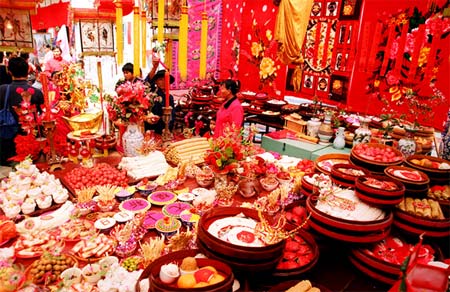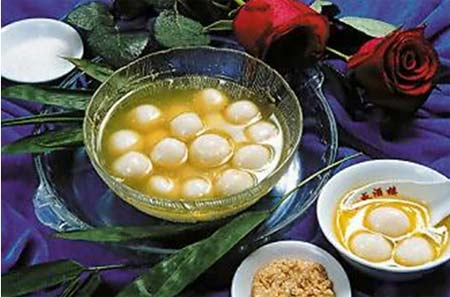
The Lantern Festival is a 2,000-year-old Chinese tradition that closes out
the Lunar New Year season. This observance falls on the fifteenth day of the
first month in the Chinese lunar calendar and changes each
year.
Description
The Lantern Festival (called
Yuan Xiao Jie or Teng Chieh in Chinese) takes place under a full moon and marks
the end of the Chinese New Year season. It has roots in Hinduism and Buddhism
and is celebrated in countries such as China, Taiwan and Thailand and in Asian
immigrant communities around the world. Business and other official closings
depend on the region.
Celebrations feature fireworks and folk dancing.
Highlights include traditional public performances such as the dragon parade and
the lion dance. The special food associated with the Lantern Festival is
yuanxiao, a round, sweet, stuffed dumpling made with sticky rice flour that
symbolizes family unity, completeness and happiness.

People hang paper lanterns along streets and around homes
and carry them around parks and outside temples. Lanterns may appear in the
shapes of dragons, birds or other animals. People write auspicious phrases on
the lanterns to ward off evil spirits and attract good ones; some will decorate
their lantern with a riddle and award a prize to the first person who solves it.
The light given off by the lanterns is said to attract heavenly spirits and
allow celebrants the chance to see
them.
History
The Lantern Festival has origins in
the beliefs of Brahmanism, a branch of the Hindu religion, and is generally
thought to have evolved during the first century into an observance honoring
Buddha (Buddhism having grown out of Hinduism). The Chinese have celebrated the
Lantern Festival for nearly 2,000 years since the Han Dynasty (206 B.C.E.?21
A.D.). Although it began as something of a religious observance, fireworks and
riddle-guessing contests were incorporated into celebrations over time to make
the occasion more festive. The lantern, a source of light, is a traditional
symbol of the lengthening days of spring. The legend of the Jade Emperor,
wherein a village was spared a deity's wrath by lighting lanterns, is also
associated with this festival.
- Jubilant Lantern Festival (Yuan Xiao)
- Lantern Festival (Yuan Xiao)
- Upcoming Chinese Lantern Festival celebrated
- Full moon and yuanxiao for Lantern Festival
- China celebrates traditional Lantern Festival with lamps and flowers
- Migrant workers embrace upcoming Lantern Festival with job expectations
- China celebrates upcoming Lantern Festival
- Lantern tickets
- Lanterns ready for impending Chinese Lantern Festival
- Hong Kong puts on martial art story lantern show ahead of festival